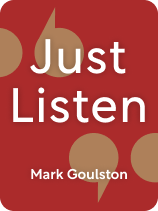

This article is an excerpt from the Shortform book guide to "Just Listen" by Mark Goulston. Shortform has the world's best summaries and analyses of books you should be reading.
Like this article? Sign up for a free trial here.
What impression do you make on other people? Do you think people see you the same way you see yourself?
Sometimes, our judgments about how we come off to other people are far from how they actually perceive us. When there’s a dissonance between how you see yourself and how others see you, misunderstandings can arise.
Here’s how you can minimize dissonance in interactions with others.
Overcoming Dissonance
Your interactions with others are often clouded by dissonance. Dissonance occurs when you’re perceived differently than the way you think you’re presenting yourself or when you perceive someone differently than they see themselves.
For example, someone might think they’re being confident and interesting when they ask you out, but to you, they seem arrogant and overbearing. Because you’re perceiving the other person differently than they think they’re coming off, you reflect different emotions back to them and you never land on the same page.
Dissonance also makes us feel unheard and powerless. This can make us defensive and emotional, which prevents us from listening to others. For example, imagine a lady at a retail store who’s passionately concerned about returning a faulty product and finding a replacement. She’s frantic because her grandchild’s birthday is tomorrow and she needs a new gift. Customer service perceives her emotion as aggressive and reflects this aggression back to her, which makes her feel like she isn’t being understood, so she becomes increasingly frustrated. The difference in perception here prevents the two people from reaching a speedy and satisfying solution.
(Shortform note: Experts say that dissonance occurs because our natural biases create blindspots that cause incomplete perceptions of other people. Additionally, our ability to read emotions is imperfect, which can lead us to misperceive someone’s behavior and intentions. For example, we tend to accurately interpret more obvious emotions such as anger, fear, surprise, and disgust, but nuanced emotions such as nervousness, confusion, and disappointment are typically more difficult to pinpoint.)
Here are two ways you can overcome dissonance by bridging the gap between how you see yourself and how others see you:
1) Ask people you trust to list your worst traits. When you become aware of the negative ways people are perceiving you, you can change them by consciously identifying and avoiding your negative traits on a daily basis. Because people are usually hesitant and uncomfortable giving negative feedback, you could instead ask people to list two ways you can improve. This way, you’re hearing ways you can improve in the future rather than reflecting on ways you’ve failed in the past. This is easier for them to say and for you to hear.
(Shortform note: In The Miracle Morning, Hal Elrod says to identify areas for personal improvement by emailing your close friends and family to ask what your three biggest flaws are. Encourage the people you email to be honest and reassure them that you’re using their feedback to grow as a person. Then, view the feedback from a constructive perspective.)
2) Prevent dissonance by preemptively cautioning whoever you’re interacting with that you may offend them, but that you don’t mean to. This is particularly useful when you’re engaging with people who belong to cultures different from yours.
(Shortform note: If you’ve already offended someone unintentionally, experts say not to blame them for overreacting, and don’t defensively argue that you didn’t mean to offend them. Instead, apologize for hurting their feelings and ask what exactly you said to make them upset so you can avoid repeating it in the future.)

———End of Preview———
Like what you just read? Read the rest of the world's best book summary and analysis of Mark Goulston's "Just Listen" at Shortform.
Here's what you'll find in our full Just Listen summary:
- Why listening is the most important step in influencing others
- How to overcome the most common obstacles to listening well
- How to break down someone’s emotional barrier






